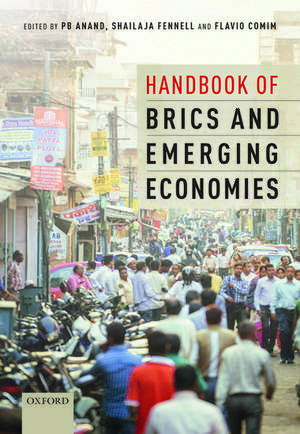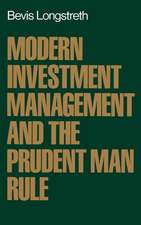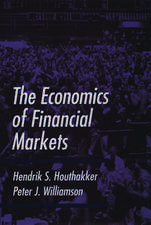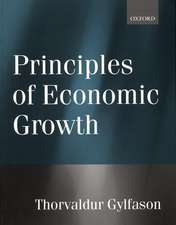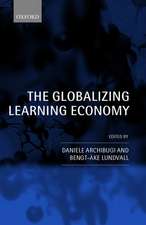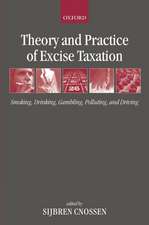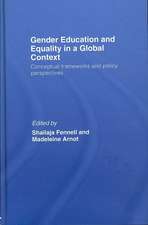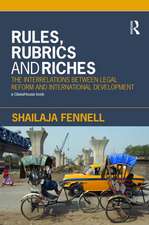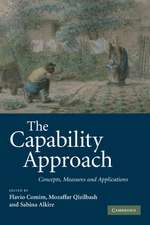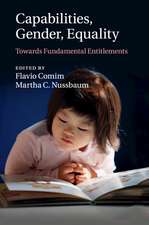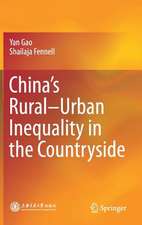Handbook of BRICS and Emerging Economies
Editat de PB Anand, Shailaja Fennell, Flavio Comimen Limba Engleză Hardback – 17 dec 2020
Preț: 1124.57 lei
Preț vechi: 1571.73 lei
-28% Nou
Puncte Express: 1687
Preț estimativ în valută:
215.22€ • 223.86$ • 177.67£
215.22€ • 223.86$ • 177.67£
Carte disponibilă
Livrare economică 13-19 martie
Preluare comenzi: 021 569.72.76
Specificații
ISBN-13: 9780198827535
ISBN-10: 0198827539
Pagini: 1184
Dimensiuni: 196 x 254 x 60 mm
Greutate: 2.15 kg
Editura: OUP OXFORD
Colecția OUP Oxford
Locul publicării:Oxford, United Kingdom
ISBN-10: 0198827539
Pagini: 1184
Dimensiuni: 196 x 254 x 60 mm
Greutate: 2.15 kg
Editura: OUP OXFORD
Colecția OUP Oxford
Locul publicării:Oxford, United Kingdom
Recenzii
This Handbook covers an astonishingly diverse range of topics in the economics, political economy, human development, global governance and inter-governmental relations of BRICS and emerging economies. It achieves the formidable feat of exploring most of those topics comparatively across different countries, marrying detailed empirical data with incisive analytical reflection. The book will be an immensely rich, authoritative, and comprehensive resource for academics and policy-makers alike.
When I coined the expression BRICs twenty years ago, I highlighted the importance of re-thinking the role of emerging economies and their potential in global economic prospects. I am thrilled to see this book comes out just in time for the twentieth anniversary. It is an exhaustive compilation of 43 chapters that provide an in-depth coverage of social, economic, environmental, institutional and global governance dimensions. Nearly a decade after my coining the expression, the five countries came together with formal summits. Presently at G7 and G20, the role of these economies and involving them for better global governance is being recognised. The ideas discussed in this book will be very useful for researchers as well as policy economists to navigate the complexities of global economic prospects over the coming decades. I am delighted to recommend this book to anyone interested in these issues.
BRICS and emerging economies tend to be understood either as countries at an interim 'half-way point' on the development journey, as nations confronting a decisive set of unique policy challenges (e.g., 'the middle-income trap'), or as distinctive institutional actors offering (e.g., via the New Development Bank) an alternative model for giving and receiving development assistance. This carefully curated Handbook provides readers with insights on all three approaches, offering constructive analytical, empirical, and policy foundations on which to advance theory and practice.
A very comprehensive book on the BRICS countries and other emerging economies covering a whole range of issues from social, environmental, political and governance and legal institutions. This book will be an asset for scholars wanting to carry out a comparative study on BRICS countries and other emerging economies.
This is a formidable compilation of essays on diverse aspects of development in many of the new powerhouses of the global economy. The scope is outstanding, covering country-specific challenges and successes, as well as broader issues of global governance and collaboration that are so vital in these uncertain times.
The Handbook of BRICS and Emerging Economies, edited by PB Anand, Shailaja Fennell, and Flavio Comim, will serve as an authoritative analysis of emerging economies for many years to come. The list of contributors to the volume and the coverage of topics is impressive. A must read for scholars and practitioners alike.
When I coined the expression BRICs twenty years ago, I highlighted the importance of re-thinking the role of emerging economies and their potential in global economic prospects. I am thrilled to see this book comes out just in time for the twentieth anniversary. It is an exhaustive compilation of 43 chapters that provide an in-depth coverage of social, economic, environmental, institutional and global governance dimensions. Nearly a decade after my coining the expression, the five countries came together with formal summits. Presently at G7 and G20, the role of these economies and involving them for better global governance is being recognised. The ideas discussed in this book will be very useful for researchers as well as policy economists to navigate the complexities of global economic prospects over the coming decades. I am delighted to recommend this book to anyone interested in these issues.
BRICS and emerging economies tend to be understood either as countries at an interim 'half-way point' on the development journey, as nations confronting a decisive set of unique policy challenges (e.g., 'the middle-income trap'), or as distinctive institutional actors offering (e.g., via the New Development Bank) an alternative model for giving and receiving development assistance. This carefully curated Handbook provides readers with insights on all three approaches, offering constructive analytical, empirical, and policy foundations on which to advance theory and practice.
A very comprehensive book on the BRICS countries and other emerging economies covering a whole range of issues from social, environmental, political and governance and legal institutions. This book will be an asset for scholars wanting to carry out a comparative study on BRICS countries and other emerging economies.
This is a formidable compilation of essays on diverse aspects of development in many of the new powerhouses of the global economy. The scope is outstanding, covering country-specific challenges and successes, as well as broader issues of global governance and collaboration that are so vital in these uncertain times.
The Handbook of BRICS and Emerging Economies, edited by PB Anand, Shailaja Fennell, and Flavio Comim, will serve as an authoritative analysis of emerging economies for many years to come. The list of contributors to the volume and the coverage of topics is impressive. A must read for scholars and practitioners alike.
Notă biografică
P.B. Anand is Professor of Public Policy and Sustainable Development and Head of Peace Studies and International Development at the University of Bradford. He is a member of the Council of the Development Studies Association and a Fellow of the Human Development and Capability Association. He previously worked in a development bank in India and managed an executive education programme portfolio at Bradford for the staff of China Development Bank (2007-13) and the Aga Khan Foundation (2013-15). He was the principal author and team leader of the Mongolia Human Development Report 2011 and contributed to UNDP studies on climate change, extractive economies, and sustainable development. He is the author of Scarcity, Entitlements and the Economics of Water in Developing Countries (2007) and many papers on global public goods, access to water and smart cities. With Flavio Comim and Shailaja Fennell, he edited New Frontiers of the Capability Approach (Cambridge University Press, 2018).Shailaja Fennell is Reader in Regional Transformation and Economic Security at the Department of Land Economy, University of Cambridge. She is a Fellow of the Human Development and Capability Association and a member of the governing council of the Development Studies Association (UK). She has undertaken more than two decades of research in both Asian and African countries, and has been a consultant with the World Bank, DFID, Oxfam and ASEAN. Her previous publications include Rules, Rubrics and Riches: The Interrelations between Legal Reform and International Development (2010), and she has published papers in the fields of comparative regional development to examine how the lives of rural and urban communities have been affected by the nature and directives of development policy.Flavio Comim is a Development Economist and an Associate Professor of Economics at the IQS School of Management, Ramon Llull University in Spain and an Affiliated Lecturer at Land Economy University of Cambridge. He has worked for the United Nations Development Programme (UNDP) and has been a consultant for UNESCO, WHO, UNEP (UN Environment Programme), and ILO in several development projects. He has co-edited several books, including The Capability Approach: Concepts, Measures and Applications (2008), with Mozaffar Qizilbash and Sabina Alkire; Capabilities and Happiness (2008), with Luigino Bruni and Maurizio Pugno; Capabilities, Gender, Equality (2014), with Martha Nussbaum; and New Frontiers of Human Development with Shailaja Fennell and P.B. Anand (2018).
